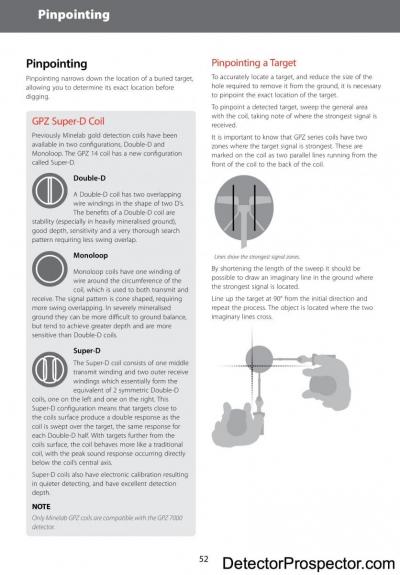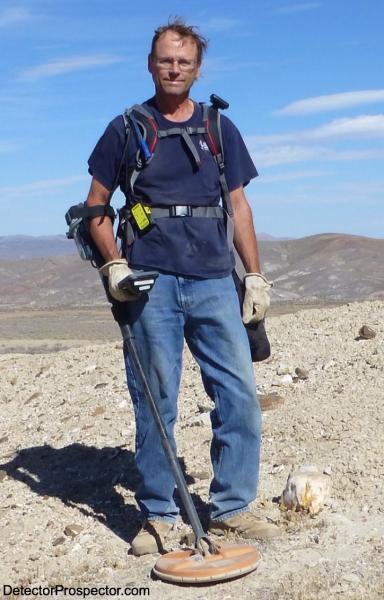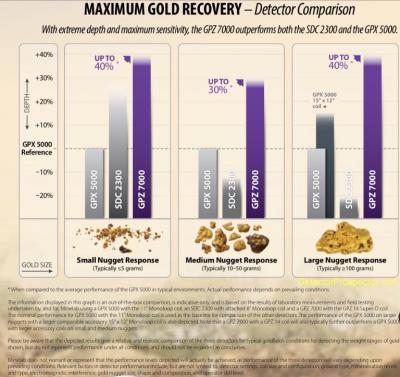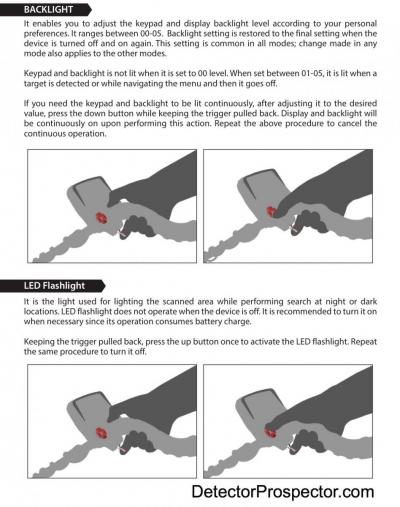-
Posts
19,732 -
Joined
-
Days Won
1,566
Content Type
Forums
Detector Prospector Home
Detector Database
Downloads
Posts posted by Steve Herschbach
-
-
I will weigh the production coil in a couple days and get back to you on it. I myself am curious about salt water and whether the unit can ground balance into the wet salt range.
-
Hi Steve,
I'm wondering how the 7000 handles hot rocks, one of the big advances with the GPX series were the special settings that ignored most hot rocks, how does the 7000 do in this regard?
Bill
I did not encounter any hot rocks the GPZ was unable to handle except for some no detector has been able to handle. I have a chunk of pure magnetite found at some California locations. Over ten pounds of magnetic iron ore. The GPZ failed just like every other detector I have tried on it. A detector that would not detect that would probably not detect gold either but one can always hope so I had to give it a try.
-
Steve, I am curious what the small box w/toggle switch on your right hip is? Does it have something to do with the external speaker you are wearing?
Merton
That is the B&Z booster made by JP which I have been using on my SDC 2300 but which I have also been experimenting with on the GPZ. It works but I am not sure yet it added any serious functionality. You can plug booster directly into detector or plug booster into wireless module so there are variations to experiment with. I have to say the wireless is nice. Proprietary no-lag good quality audio.
-
Hi Scott,Just wondering about the battery life. How many hours? And how much would the GPS and Maps features eat into the battery life each day.
Does the Super D coil act like a mono coil on the 5000?
I field tested a unit using the same battery as comes on the CTX 3030. This smaller battery only made it about 5 hours. The new units including the one I just got have the new larger production battery which is supposed to run in excess of eight hours. I need to do a run in most conservative settings and a run with absolutely everything jacked up to get an idea of difference myself. Good news is CTX battery makes a great backup. In fact I am personally planning on using a future smaller coil in conjunction with the smaller battery to get the weight down by maybe a pound? Not sure as it will depend on how much weight a smaller coil sheds but a pound seems possible in total with savings with smaller battery.
The coil acts like a mono at distance but closer up in hotter in two strips lengthwise longitudinally pretty much where the reinforcement ribs are on top of the housing. Bruce Candy illustrates it well in the video.
-
The original thread has been updated with links to the newly posted up to date instruction manual on Minelabs website.
-
Here it is, good stuff as always http://www.minelab.com/aus/treasure-talk/introducing-the-gpz-7000
The only major note I will add is that the High Yield/Normal ground combination can be even more effective in our low mineral ground conditions in the US than the High Yield/Difficult ground combination that JP recommends for most Australian ground. Not all ground here tolerates it but where it works it really works.
-
Thank you Steve...
You are always very clear that these are your opinions...
That is a rocky hill you are standing on, are you at liberty to say where that place is?
fred
Northern Nevada
-
ATX redundant? No way! I really like my ATX.
The ATX is my fully submersible rough and tough in the salt water day after day detector. It also is a very good prospecting detector so does double duty.
I had a worry in selling my GPX 5000 and large coils that I would miss it when it came to ground coverage. There is not yet a large ground covering coil available for the GPZ 7000 though there will be. Yet I did not see keeping the GPZ as being worthwhile for just that one purpose.
So I punted. I got the 20" x 15" mono for my ATX. If I have a huge field to cover until the large coil for the GPZ becomes available I will be swinging that ATX with 20" mono coil. I doubt I will gain any depth but I will cover more ground and sometimes that is more important than depth. And now you know the rest of the story!
-
I have to admit it is a bit frustrating and a fine line to walk. People elsewhere are complaining they do not like all the hype. Then the minute you try and stay low key they complain they are disappointed. I honestly just want to help people out as best I can. I do not want somebody to get a GPZ and then think they got sold the proverbial pig in a poke. At the same time I am very excited about the detector and if I let loose with that would appear to be the biggest hyper on the planet. And that could lead to disappointment.
I am just going to try and do my best to offer good advice and hope it helps.
I encourage anyone with any doubts, any hesitation, to just wait. The GPZ 7000 is going to be rapidly adopted and will hit the fields in large numbers very soon. No wait for months before you can buy one. People are buying them now and will have them out in the next couple weeks. So just relax and wait a bit and see what happens. The gold has been waiting for you for millennia and I am sure it can wait a bit longer!
-
This is my attempt to explain my own personal opinion of the GPZ 7000 based on what I know so far. The very real problem is I do not know everything and in fact still consider myself a novice with the detector. I have a lot to learn yet, so those thinking I know everything and can answer everything definitively are going to be disappointed. Some things I flat out do not know, other things all I can do is offer a qualified guess.
What I can promise is I am not out to talk anyone into getting one. Not my job. I did not get my GPZ 7000 for free although I did get a great deal on it. Despite what people may think being a field tester does not obligate me to post about the GPZ 7000 and it certainly does not make me a salesperson. I am however more than happy to offer my opinion for those that are interested. Here goes with where I am right this minute 2/18/2015.
I am fortunate to have had the opportunity to field test the new Minelab GPZ 7000 detector. It has allowed me time to make decisions regarding my own use of detectors this season earlier than most people. It also gave me a place first in line and I now have a brand new GPZ 7000 of my own.
My use of the GPZ 7000 combined with what I think I know about how it works made me decide I had to have one. I am in my detecting prime right now and plan on spending a huge amount of time swinging a detector looking for gold now and in the future. I will never use just one detector for everything but the fact is that I can only swing one detector at a time. I need to decide what detector will be my primary unit for the bulk of my detecting. What one machine will best return my investment of time and effort in possible gold finds? I have decided that machine is the Minelab GPZ 7000.
The GPZ with its 14" x 13" Super D coil provides an across the board powerful solution for getting gold both large and small on the first pass. Most ground I pass a coil over I have exactly one chance of finding a target. It has to happen on that first pass. Sure, when I am beating a patch to death I may hit the same area over and over. But most of my detecting is all about being over ground I have never been over before. I have to have confidence the machine I am using is going to give me my best shot at getting whatever is there on the first and likely last pass of the coil.
As far as I am concerned all the percentages and charts and stuff is something others can debate, though I will post some thoughts on that separately. The bottom line is I am convinced the GPZ 7000 does give me a technological edge at this time, and that by applying that edge early and as often as I can I am increasing my odds of finding gold. If I never said another word about the detector that really just sums it up.
I thought very hard about whether I should keep my GPX 5000. I decided any time spent with it would detract from the advantage I would enjoy by using the GPZ instead. It should not have been lost on people that I recently sold my GPX 5000 and almost every accessory I owned for it. I only have a few odds and ends left I intend to sell soon. That alone should tell you everything you need to know about what I think of the GPZ 7000.
I even considered selling my SDC 2300. However, even though more coils will be available soon for now all the GPZ has is the 14" x 13" so I decided I had better keep the SDC just because it has an 8" coil. The reality is I very much like the grab and go super compact nature of the SDC and will probably keep it anyway, but it is a moot point until a smaller coil becomes available for the GPZ. Small coils are a must for nooks and crannies and other places larger coils can't fit.
The GPZ 7000 does not replace or take away from the SDC 2300 and GPX 5000 in the current Minelab lineup. They are both fantastic units. The GPX 5000 and its vast ecosystem of coils and other accessories remains the no-brainer best value for many people. The SDC 2300 will continue to be the hot small gold sniper it has been proven to be. A person who owns both will have much of the power of the GPZ 7000 already at their disposal.
The thing is the GPZ 7000 to the best of my determination so far seems to offer everything those two models offers in a single unit, and then goes farther yet. I can't swear that under every circumstance and in every scenario that the GPZ 7000 trumps the SDC 2300 or GPX 5000. Certainly in the case of the GPX 5000 all those accessory coil options do matter, especially where ground coverage is job one. The SDC does have that little coil.
All I can say is that for that proverbial one pass over any particular chunk of ground I have to pick the GPZ 7000 as my best bet for getting whatever gold is there or missing it forever. And for hitting already hunted ground it is going to find gold both those detectors will miss no matter how many times they pass over the ground. The GPZ 7000 in my opinion is the best overall single solution available. If I was told I had to sell all but one machine and could only use one detector for gold prospecting I would without hesitation choose the GPZ 7000.
In closing, I suddenly see a bright future ahead. I really had given up on there being anything significantly better than a GPX 5000. The GPZ however is not the end of the road but just the beginning. As good as it is it is not perfect and I am certain we will see further improvements as the platform is refined in the future. That first step is often the biggest however, and the GPZ in its way is every bit the breakthrough the SD 2000 was when it was released. Nobody can put back all the gold that has been detected in the twenty years since but the GPZ 7000 is definitely the next step in getting what is left.
My thanks to Minelab for being able to say I had a part in this, small as it has been. Thanks especially for investing the huge amount of dollars and people power it took to make this happen for us, the prospectors of the world. Were it not for Minelab electronic prospecting would not be near what it is today.
Disclaimer - this is just me trying to explain my thought process regarding my use of detectors this season. It is not an attempt to say "here is what I am doing and you should do it also." Just because I am all in with the GPZ 7000 does not mean I am saying that is the best idea for everyone. It is all about prospecting skills, not about the detector you use. The GPZ 7000 will not turn a poor prospector into a good one. It lacks that magic button. At the end of the day it is just another metal detector and it is up to the prospector behind the handle to make it deliver. Good Luck!
-
All the nuggets I found with the GPZ fairly well yelled out at me. I think all they are saying there is that those really deep fringe targets are not going to yell out and may have a very faint response. Nothing any very experienced hunter should find surprising but perhaps they felt needed pointing out in the manual. JP is better equipped to answer this one since he is the only person that has dug an over 50 gram nugget over a couple feet with a GPZ that I know of. We should be hearing from him soon.Steve and Chris - I've read the manual and am wondering about the sound signal for large deeper targets.
The manual states :
"Large deep nuggets (typically ≥ 50 grams)
produce complex and subtle audio
responses"
What was your experience ? Any info appreciated .....
Cheers
BB
-
Steve, Chis (and JP if you're tuned in.)
Having used these detectors, are you excited to be swinging one into the future. I've read your posts and understand the variables involved, leaving the larger nuggets aside what was your findings on the bread and butter nuggets of around 2 to 5 grams at depth. Do you think the 7000 could, would or should earn its keep on these.
I am VERY excited to have a GPZ 7000 and can't wait to spend every minute possible this season using it. There is no question the machine will earn its keep for anyone used to paying for their detectors will the gold they find. It is however all about being a good prospector and not about the detector. The GPZ 7000 will not turn a poor prospector into a good prospector. That is one function it lacks.
-
I'm not prefacing it by implying I won't believe the answers at all, in fact I've been reading your detector reviews since you started writing them back on the AK forum.
However, I've asked questions like these in many places and many forums for many machines and more often than not received responses from people saying depth tests mean nothing, or you can't fairly compare X machine to Y machine, etc without receiving an actual answer.
Which is why I tried to tiptoe around it by saying I know these are controversial.
But apparantly that approach doesn't work either.
I do not consider the questions controversial in the slightest which is why I asked. There are certainly situations where a Gold Bug 2 or a GMT might be a better choice than a GPZ 7000. I am not selling my Gold Bug 2 for that very reason. As far as the GPZ vs GPX goes there are over 100 accessory coils available for the GPX. I would be a fool to claim the GPZ outperforms the GPX under all situations and under any circumstances. I am comfortable enough with the overall situation to have sold my GPX but I think it is fair to say that until many more people from around the world weigh in questions may remain. The only quantitative testing I know of was performed by Minelab in order to substantiate the figures they quote in their sales brochures and on their website. Anyone with doubts or concerns need only wait what I think will be a short while for a clearer picture to develop by way of cumulative reporting from what appears to be a large number of early adopters poised to hit the goldfields.
-
Hi jasong
"I know people won't like this question for a long list of reasons but it's inevitable so I'm asking"
"I feel this question may be met with some reservation since I'm sort of side stepping the 7000's moment to shine as a unique star"
It appears you have concerns about getting honest answers here. When people preface their questions by implying they won't believe the answers it all seems kind of pointless, no?
-
http://www.minelab.com/treasure-talk
And the official Minelab press release http://www.minelab.com/usa/consumer/knowledge-base/news
Note detector availability at dealers February 23rd
-
How about something like current Racer at 14 kHz push a button and now your have 28 kHz? Coils can usually be made to work well at harmonic multiples.
One thing usually is if the frequency gets too high you lose resolution at the high end of the VDI scale but gain on the low end. Not so good for coin detecting per se but good for separating low conductors.
-
It has always been cheaper for an Aussie to buy Minelab detectors in the U.S. than in Ausrtalia and you can bet that has had them quite unhappy with Minelab. Looks to me like Aussies can finally buy a detector made by an Australian company cheaper in Australia than here.
The way it was they paid way more for US detectors and way more for Australian detectors. Stuff is horribly expensive there. Looks like Minelab finally decided to help the home team.
-
-
Actually paid in full early sales are going much stronger than I would have guessed considering the price of the unit. Seems there is a lot of pent up demand after five years.
I am not sure the gag order matters much. The brochure actually does tell a person pretty much all they need to know, unless they choose to disbelieve it.
-
No the coil is not hard-wired.
-
I agree Chris. There have been only few detectors that ran around 30 kHz. The Minelab XT 17000 ran at 6.4 & 32 kHz but was a fairly low gain detector. The Minelab American Goldstriker was 32 kHz only. The ill fated Fisher Gold Strike ran at 30 kHz and actually was a good detector as far as detecting stuff, just too weird in how it went about doing it.
-
Welcome to the forum G.B.
I sure enjoyed Australia, the land and the people, when I visited there. Just an amazing place. Thanks for posting!
-
Hi Tom,
It is the ground balance number. Ground phase is the target id of the ground, telling you what kind of ferrous material average the detector is being set to tune out. It is a ground rejection number. It can mean magnetite or hematite or maghemite but usually is a mix of these minerals. The ground phase or ground balance number does not tell you how mineralized the ground is but people constantly quote it as such.
From the Makro Racer Owners Manual page 15:
"Ground balance value provides information about the ground you are searching on. Some typical ground types are as follows:
Wet salt water or wet alkali soils 0-25
Wet salt water and wet alkali soils covered with dry layers 25-50
Regular, low-quality soils 50-70
Highly magnetic soils, magnetite or maghemite and similar highly mineralized soils, black sand 70-90"
The Mineral % pie chart tells you how mineralized the ground is. Owners Manual page 21:
"The Magnetic Mineralization Indicator consists of 8 levels. The indicator is shown empty at low mineral levels during search and at start up. In areas where the magnetic mineral level is high, the indicator level increases according to the intensity. This measurement can be summarized as the level of magnetic property and intensity of the ground. Simply, if you are working in an area which contains intense and magnetized minerals, the level will be high. If you are working on a less intense ground, the level will be low.
This measurement is important from two aspects. First, on grounds with high magnetic mineralization, search depth is low and users should be aware of this fact. Second, magnetic mineralization is a property which is particularly seen with mineralized rocks and this measurement plays an important role for the device to eliminate the false signals produced by these rocks."
Yes, there is a ground grab, which is nothing more than push button ground balance.
You may want to look at the link to the owners manual I provided. People avoid owners manuals but they are a form of treasure hunting in and of themselves. Also read Gold Prospecting with a VLF Metal Detector by Dave Johnson which directly addresses your questions.
-
The screen and adjustment buttons are lit and have five levels of adjustment plus the off setting. 00-01-02-03-04-05
The LED flashlight is a totally separate item, either on or off.
From the Makro Racer Owners Manual:






GPZ 14 Coil For Minelab GPZ 7000
in Minelab Metal Detectors
Posted
The new GPZ 14 is a 13" x 14" coil fully waterproof to three feet. It comes with a scuff cover and has its own lower rod section attached. The coil, lower rod, and scuff cover together weigh exactly three pounds. It uses a winding configuration not used in consumer detector models before which facilitates the technology used in the GPZ 7000. There is over 6000 feet of copper wire in each coil! These coils are compatible only with the GPZ 7000. Minelab GPX coils will not work on the GPZ 7000.
Minelab GPZ 14 Coil with Lower Rod and Scuff Cover